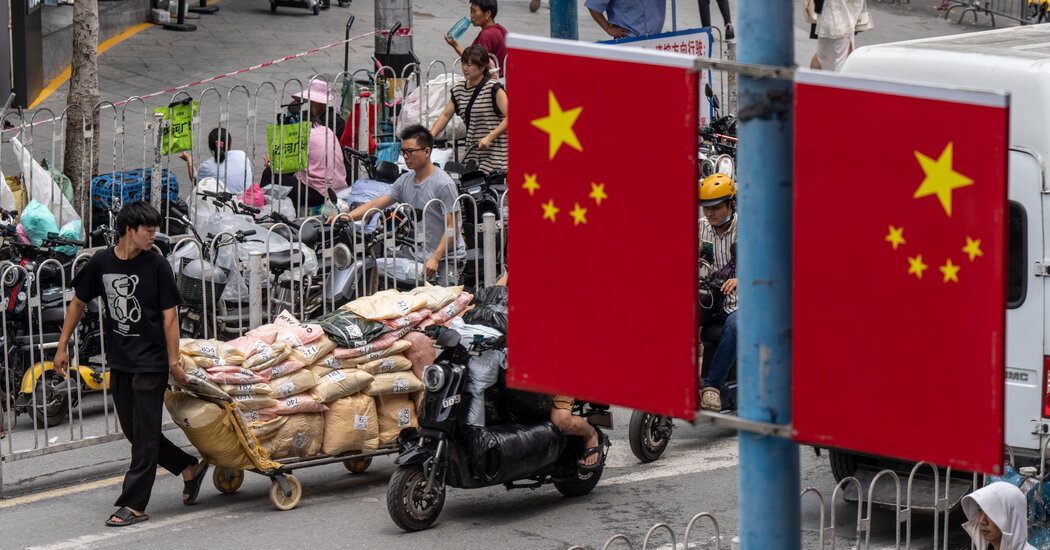The expansion of the loophole for tariff-free shipments of goods nearly a decade ago gave rise to Temu, Shein and other low-cost online retailers offering items straight from Chinese factories at unfathomable discounts.
It also unleashed something else — a cascade of billions of dollars of digital advertising that provided a windfall for Meta, Alphabet and other technology industry giants. Temu and Shein, jockeying for the attention of American shoppers, blanketed seemingly every inch of the internet with their ads. In the last two years, only Amazon spent more on online advertising in the United States than Shein or Temu.
Now, the advertising bonanza might be coming to an end after the demise of the shipping loophole that spurred it.
On Friday, President Trump eliminated the exemption that had allowed goods made in mainland China and Hong Kong valued at less than $800 to enter the United States without being subject to import taxes. For Temu and Shein, this means they are now subject to tariffs of as much as 145 percent to bring over Chinese goods. Last week, Temu started adding “import charges” to certain products, which more than doubled the overall price to buy and ship the items.
A Temu spokesperson said on Friday that the company had stopped shipping products from China directly to customers in the United States, and that its U.S. orders would now be shipped from local warehouses in America, as the business “transitions to a local fulfillment model.” Shein did not immediately respond to an email requesting comment.
The new tariffs are expected to deal a punishing blow to companies built on selling goods at rock-bottom prices and attracting customers through aggressive online advertising.
Using the slogan “Shop Like a Billionaire,” Temu bought advertising time during the Super Bowl.
Temu’s parent company, PDD Holdings, used a similar strategy for its Chinese e-commerce app, Pinduoduo, in China, spending lavishly on advertising to grow rapidly in a competitive market.
Sky Canaves, a principal analyst for retail and e-commerce at the research firm eMarketer, said the ads from Temu and Shein were once “inescapable” on search, social media and apps. But that is changing.
“They’ve already pulled back their advertising pretty heavily,” she said.
Over a two-week period starting March 31, Temu spent 31 percent less on U.S. daily advertising on Facebook, Instagram, TikTok, Snap, X and YouTube than its average daily spending on those platforms in the previous 30 days, according to estimates from Sensor Tower, a market intelligence firm. Shein’s daily advertising outlays on its social networks in the United States were down 19 percent over the same two weeks.
Temu and Shein, which had flooded Google in the United States with ads for the goods they sell, started to disappear from the platform in April. On April 5, Temu accounted for 19 percent of all U.S. ads displayed on Google Shopping, but that figure dropped to zero a week later, according to research by Tinuiti, a marketing firm. Shein went from around 20 percent in early April to zero by April 16.
Tinuiti identified the tariffs as the main factor behind the advertising pullback. It said the reduction in spending coincided with the raising of prices by both companies on certain products.
Without the constant advertising presence, Temu’s and Shein’s apps have fallen off the charts of the 10 most downloaded mobile apps in the United States. Temu served about 30 million daily users in the United States, the company disclosed in a lawsuit filed against Shein in 2023.
At Meta, which owns Facebook, Instagram and WhatsApp, some Asian retailers had already reduced their U.S. advertising spending in anticipation of the end of the so-called de minimis exemption, Susan Li, Meta’s chief financial officer, said on a conference call with investors on Wednesday. Some of the spending has been redirected to Meta platforms in other markets, but the spending in April was down from a year earlier, she said. Ms. Li did not name any of the companies.
Investors were closely watching what Meta said because advertisers from China, led by Temu and Shein, had been one of the company’s fastest-growing segments. Last year, advertisers from China generated $18.4 billion in revenue for Meta, accounting for about 11 percent of its total and more than doubling in size since 2022.
Snap, a social media firm, said that “a subset of advertisers” had cut back on spending because of the changes to the shipping loophole. The company declined to provide a forecast for its current quarter, citing the uncertainty caused by the tariffs. Snap’s shares fell 12 percent after the announcement.
Last week, Philipp Schindler, Google’s chief business officer, said changes to the tariff loophole “will obviously cause a slight headwind to our ads business in 2025,” primarily from Asian e-commerce companies. He also did not identify specific companies.











